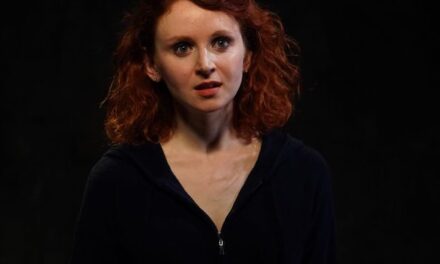by Carol Rocamora
Unearthing old theatre gems is like digging for truffles – and British director Hugh Ross has found one. It’s called The Roundabout, a long-lost treasure by J. B. Priestley, now playing at 59E59 Theaters as part of Brits Off Broadway – and it sparkles with the wit of Oscar Wilde, the frivolity of Coward, and the saltiness of Shaw.
British-born Priestley (1894-1984) lived a full, celebrated life as a man of letters. His prodigious dramatic oeuvre includes An Inspector Calls, now enjoying a high-profile revival in London. In contrast, The Roundabout, written early on in his career (1931) as a star vehicle for Peggy Ashcroft, virtually dropped out of sight until Ross rediscovered it.
And how lucky for us that he did. The Roundabout holds the promise of an entertaining comedy of manners– but delivers far more. Set on the country estate of Lord Richard Kettlewell over a weekend, it features a colorful assortment of surprise guests who make far more mayhem than their host (Brian Protheroe) ever bargained for. “Who’s coming to lunch?” becomes the first act’s running gag. There is Pamela (Emily Laing), the host’s estranged daughter, who shows up unannounced straight from Moscow, where she’s been representing the Proletarian Society from Oxford. Along the way, she’s picked up “Comrade” Staggles (Steven Blakeley), an over-sexed political zealot with a Yorkshire accent. Next to arrive unannounced is the lovely Hilda Lancicourt (Carol Starks), the host’s latest love interest. Meanwhile, the one invited guest – Lady Knightsbridge (Richenda Carey) spends her time confiding in Parsons, the butler (Derek Hutchinson), about how to buy lottery tickets for the latest sweepstakes. Oh, and there’s Alec Grenside (Ed Pinker), resident artist and Pamela’s potential love interest (but let’s not get ahead of this delightful plot).
This coterie of characters is observed by Churton (Chuffy) Saunders (Hugh Sachs), the host’s confidant and resident wit, who offers commentary straight out of an Oscar Wilde play, such as: “Jumping to conclusions – it’s the only exercise I get” or “Exaggeration – one of the few luxuries I can afford.”
Comedy soon escalates to farce with the surprise arrival of Lady Kettlewell (Lisa Bowerman), absent for a decade. The Kettlewells spend Act Two dealing (ambivalently) with their unexpected family reunion, while Comrade Staggles dashes around the drawing room and garden, chasing at least three female characters.
In the midst of all this frivolity, playwright Priestley offers a sharp, satirical birds-eye view of an anxious era when England’s social order is changing and facing growing threats from abroad. “I’m an Edwardian. This new world has nothing to do with me,” laments Chuffy nostalgically. “Communism? Is there any money in it?” queries Lady Knightsbridge, who, like her upper class host, is feeling the perils of economic change. Parsons, the butler, offers the best Wildean one-liner. Addressing Comrade Staggles, he says “Communism is good for a young gentleman like you, but you’ll get over it.” And perhaps the most sobering, again from Chuffy: “None of us knows anything about our futures.”
At times you’ll feel the influence of Priestley’s predecessors. Pamela plays like a direct descendant of Shaw’s rebellious Major Barbara, while Lady Knightsbridge comes across as a dotty cousin of Wilde’s imperious Lady Bracknell (The Importance of Being Earnest). As for Staggles, he’s a wilder version of the eccentric Roland Maule in Noel Coward’s Present Laughter. But never mind – how delightful see them all together in one play!
Parsons, the butler, who suffers several dizzying denouements, offers the sagest summary: “We’re living in a time of great social confusion.” Still, playwright Priestley wants to end on a high note. In the play’s waning moments, Staggles surreptitiously drains the dregs of the “bourgeois” brandy that his host has proffered and he initially disdained. “Mozart,” he sighs. “That’s the stuff. That what’s life ought to be like – Mozart.”
The Roundabout, by J. B. Priestley, directed by Hugh Ross, at 59E59 Theaters, now until May 28.


























